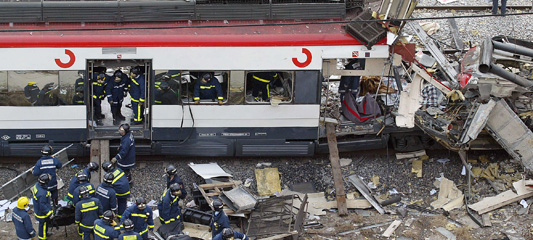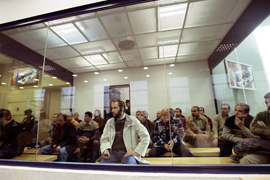Verdict due in Madrid bombing trial
Judge to rule on 28 defendants accused of role in one of Europe’s deadliest attacks.

 |
| The attacks on March 11, 2004 left 191 people dead and 1,800 injured [AFP] |
Verdicts are due to be delivered by a Spanish court against 28 defendants accused of being responsible for one of Europe’s deadliest ever bomb attacks that left 191 people dead and 1,800 injured in Madrid in 2004.
Security was tight across Madrid in preparation before a three-judge panel was set to read out verdicts and sentences after a trial lasting nearly five months.
Ten bombs triggered by mobile phones concealed in bags destroyed four trains packed with commuters in the Spanish capital on March 11, 2004.
The attacks were initially blamed by the then government on Basque separatists before evidence suggested it could have been an al-Qaeda inspired attack.
Occuring just days before a general election the public outrage saw the conservative government voted from office, despite pre-election predictions of victory.
| In video |
After a four month break to consider the evidence, Judge Javier Gomez Bermudez will call the court to sit at about 11am (1000 GMT) and read a summary of the trial.
He will then announce which suspects have been found guilty or innocent and read out sentences.
Twenty-nine people, mostly Moroccans and Spaniards, have been tried for crimes ranging from masterminding the attack to stealing dynamite from a mine in northern Spain. One has since been cleared.
Political consequences
The eight main suspects face multiple sentences that could total 39,000 years for each, although such figures are academic because under Spanish law nobody can stay in prison for more than 40 years.
All suspects have pleaded innocent and most are expected to appeal against their sentences.
Seven suspected ringleaders in the case blew themselves up as police prepared to raid a flat in Madrid’s suburbs about three weeks after the attacks, and most of those left to stand trial were considered secondary figures.
A two-year investigation concluded the group was inspired by al-Qaeda, but had no direct links to it, nor did it receive financing from bin Laden’s organisation, Spanish investigators say.
The attacks caused huge anger in Spanish society and had wideranging political consequences.
In elections three days after the blasts, voters elected the opposition Socialists and ousted removed a government that had sent 1,300 peacekeepers to Iraq.
Many Spaniards blamed that administration for the attack, saying it had made the country a target by supporting the Iraq war.
The Socialists quickly withdrew the soldiers from Iraq.
Electoral role
The trial proved equally divisive.
 |
| The 28 defendants are accused of a wide range of crimes [AFP] |
The conservative opposition used it to advance several theories, including unsubstantiated allegations that Basque separatists were involved in the attack, or that members of the Socialist party somehow knew about it beforehand.
Most of the conspiracy theories were ruled out by the court, with a conservative politician who was Spain’s police chief at the time of the attacks fined and threatened with jail for refusing to name his source when he testified that an internal police document linked ETA with the blasts.
Jose Luis Zapatero, the Spanish prime minister, said he hoped the verdict would “give a definitive answer to those who have put forth absurd and despicable doubts about March 11.”
He asked both political parties to support the ruling and put the acrimony behind them.
That call was unlikely to be heeded, however, particularly as national elections are due next March.
Angel Acebes, a senior member of the opposition Popular Party, on Monday accused the government of preparing to use the verdict to attack the conservatives.
“We have never used a terrorist attack for electoral gains,” he said.
He said the Socialist party “has done that and continues doing it,” – a reference to Zapatero’s victory after the March 11 attacks.
